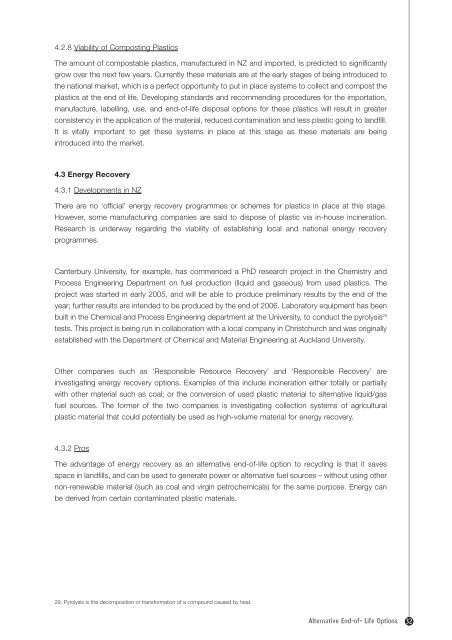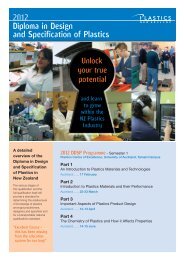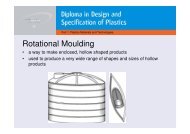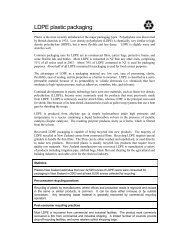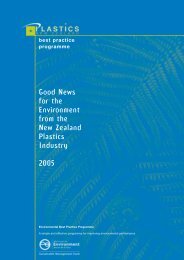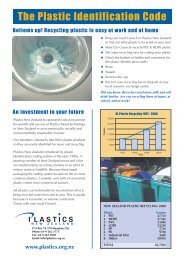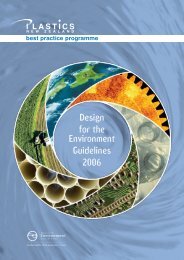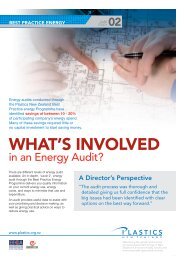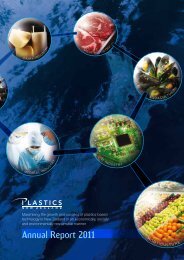Sustainable End-of-Life Options for Plastics in New Zealand
Sustainable End-of-Life Options for Plastics in New Zealand
Sustainable End-of-Life Options for Plastics in New Zealand
You also want an ePaper? Increase the reach of your titles
YUMPU automatically turns print PDFs into web optimized ePapers that Google loves.
4.2.8 Viability <strong>of</strong> Compost<strong>in</strong>g <strong>Plastics</strong><br />
The amount <strong>of</strong> compostable plastics, manufactured <strong>in</strong> NZ and imported, is predicted to significantly<br />
grow over the next few years. Currently these materials are at the early stages <strong>of</strong> be<strong>in</strong>g <strong>in</strong>troduced to<br />
the national market, which is a perfect opportunity to put <strong>in</strong> place systems to collect and compost the<br />
plastics at the end <strong>of</strong> life. Develop<strong>in</strong>g standards and recommend<strong>in</strong>g procedures <strong>for</strong> the importation,<br />
manufacture, labell<strong>in</strong>g, use, and end-<strong>of</strong>-life disposal options <strong>for</strong> these plastics will result <strong>in</strong> greater<br />
consistency <strong>in</strong> the application <strong>of</strong> the material, reduced contam<strong>in</strong>ation and less plastic go<strong>in</strong>g to landfill.<br />
It is vitally important to get these systems <strong>in</strong> place at this stage as these materials are be<strong>in</strong>g<br />
<strong>in</strong>troduced <strong>in</strong>to the market.<br />
4.3 Energy Recovery<br />
4.3.1 Developments <strong>in</strong> NZ<br />
There are no ‘<strong>of</strong>ficial’ energy recovery programmes or schemes <strong>for</strong> plastics <strong>in</strong> place at this stage.<br />
However, some manufactur<strong>in</strong>g companies are said to dispose <strong>of</strong> plastic via <strong>in</strong>-house <strong>in</strong>c<strong>in</strong>eration.<br />
Research is underway regard<strong>in</strong>g the viability <strong>of</strong> establish<strong>in</strong>g local and national energy recovery<br />
programmes.<br />
Canterbury University, <strong>for</strong> example, has commenced a PhD research project <strong>in</strong> the Chemistry and<br />
Process Eng<strong>in</strong>eer<strong>in</strong>g Department on fuel production (liquid and gaseous) from used plastics. The<br />
project was started <strong>in</strong> early 2005, and will be able to produce prelim<strong>in</strong>ary results by the end <strong>of</strong> the<br />
year; further results are <strong>in</strong>tended to be produced by the end <strong>of</strong> 2006. Laboratory equipment has been<br />
built <strong>in</strong> the Chemical and Process Eng<strong>in</strong>eer<strong>in</strong>g department at the University, to conduct the pyrolysis 29<br />
tests. This project is be<strong>in</strong>g run <strong>in</strong> collaboration with a local company <strong>in</strong> Christchurch and was orig<strong>in</strong>ally<br />
established with the Department <strong>of</strong> Chemical and Material Eng<strong>in</strong>eer<strong>in</strong>g at Auckland University.<br />
Other companies such as ‘Responsible Resource Recovery’ and ‘Responsible Recovery’ are<br />
<strong>in</strong>vestigat<strong>in</strong>g energy recovery options. Examples <strong>of</strong> this <strong>in</strong>clude <strong>in</strong>c<strong>in</strong>eration either totally or partially<br />
with other material such as coal; or the conversion <strong>of</strong> used plastic material to alternative liquid/gas<br />
fuel sources. The <strong>for</strong>mer <strong>of</strong> the two companies is <strong>in</strong>vestigat<strong>in</strong>g collection systems <strong>of</strong> agricultural<br />
plastic material that could potentially be used as high-volume material <strong>for</strong> energy recovery.<br />
4.3.2 Pros<br />
The advantage <strong>of</strong> energy recovery as an alternative end-<strong>of</strong>-life option to recycl<strong>in</strong>g is that it saves<br />
space <strong>in</strong> landfills, and can be used to generate power or alternative fuel sources – without us<strong>in</strong>g other<br />
non-renewable material (such as coal and virg<strong>in</strong> petrochemicals) <strong>for</strong> the same purpose. Energy can<br />
be derived from certa<strong>in</strong> contam<strong>in</strong>ated plastic materials.<br />
29. Pyrolysis is the decomposition or trans<strong>for</strong>mation <strong>of</strong> a compound caused by heat.<br />
Alternative <strong>End</strong>-<strong>of</strong>- <strong>Life</strong> <strong>Options</strong><br />
32


